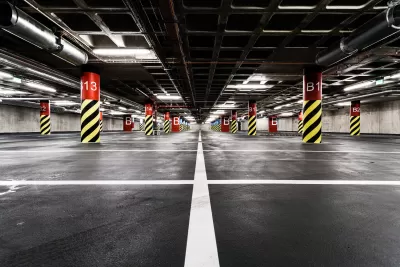A new study shows a significant reduction in housing construction costs in cities that have reduced or eliminated minimum parking requirements.

As more U.S. cities eliminate minimum parking requirements as part of an effort to boost housing supply and affordability, a new white paper from the Rutgers Center for Real Estate assesses the impact of parking reforms on residential development, writes Maddy McCarty in BisNow.
According to the paper, “Any reduction in mandated parking requirements for residential developments will lower initial construction costs and decrease ongoing operating costs, which will effectively allow for the reduction of rents.”
McCarty adds that “The Rutgers study found that if the body governing New Jersey’s parking requirements reduced the standard by just a half-car per unit, average rents in the state should fall by nearly 4%, all else holding equal.”
The article highlights examples from around the country, revealing how much money was saved on specific housing projects thanks to reduced parking requirements. A standalone parking structure costs roughly $28,000 per spot, on average. “In Minneapolis, the cost of new studio apartments, previously averaging $1,200 per month, went down to less than $1K per month in complexes where parking minimums were waived.”
Although parking reform isn’t a one-size-fits-all solution—“parking is driven by the demographic and the needs”—the study shows that letting developers build parking based on demand rather than arbitrary requirements can have a significant impact on construction costs and, in many cases, the number of housing units that get built.
FULL STORY: Over 1,400 Municipalities Have Altered Parking Minimums In Affordable Housing Push. Has It Worked?

Maui's Vacation Rental Debate Turns Ugly
Verbal attacks, misinformation campaigns and fistfights plague a high-stakes debate to convert thousands of vacation rentals into long-term housing.

Planetizen Federal Action Tracker
A weekly monitor of how Trump’s orders and actions are impacting planners and planning in America.

In Urban Planning, AI Prompting Could be the New Design Thinking
Creativity has long been key to great urban design. What if we see AI as our new creative partner?

How Trump's HUD Budget Proposal Would Harm Homelessness Response
Experts say the change to the HUD budget would make it more difficult to identify people who are homeless and connect them with services, and to prevent homelessness.

The Vast Potential of the Right-of-Way
One writer argues that the space between two building faces is the most important element of the built environment.

Florida Seniors Face Rising Homelessness Risk
High housing costs are pushing more seniors, many of them on a fixed income, into homelessness.
Urban Design for Planners 1: Software Tools
This six-course series explores essential urban design concepts using open source software and equips planners with the tools they need to participate fully in the urban design process.
Planning for Universal Design
Learn the tools for implementing Universal Design in planning regulations.
Gallatin County Department of Planning & Community Development
Heyer Gruel & Associates PA
JM Goldson LLC
City of Camden Redevelopment Agency
City of Astoria
Transportation Research & Education Center (TREC) at Portland State University
Jefferson Parish Government
Camden Redevelopment Agency
City of Claremont





























